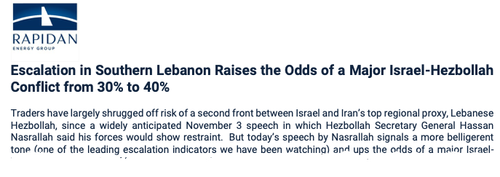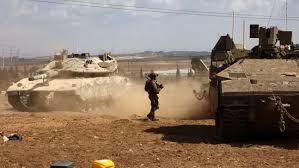A twin crisis is unfolding for the Biden administration as the US tax-payer-funded Ukrainian military bombs key crude refineries deep within Russian territory with suicide drones. The administration has pleaded with the Ukranians to halt strikes on Russian energy infrastructure as this will only contribute to tightening global supplies and push energy prices higher, as well as inflation in the US, hurting Biden’s re-election odds.
Now for the other crisis that’s unfolding in the Middle East: US Vice President Kamala Harris told ABC’s “This Week” that a major attack on the Gazan city of Rafah, where more than a million Palestinians have sought refuge, “would be a huge mistake.”
“We have been clear in multiple conversations and in every way that any major military operation in Rafah would be a huge mistake,” Harris said.
She added: “I have studied the maps – there’s nowhere for those folks to go. And we’re looking at about a million and a half people in Rafah who are there because they were told to go there.”
Harris was asked whether there would be “consequences” from the US on an Israeli counteroffensive in Rafah. She responded, “I am ruling out nothing.”
This comes as The Jerusalem Post said Israeli Prime Minister Benjamin Netanyahu and other senior officials say an operation into the southern Gazan city is “imminent.”
Bloomberg quoted Israeli intelligence that estimate about 5,000 to 8,000 Hamas fighters are in Rafah.
As we’ve explained before, in the note titled “Terrified” Joe Biden Demands Ukraine Halt Strikes On Russian Refiners As It Is Sending Oil Prices Surging,” Biden’s foreign policy has been and always been about crude markets.
So, of course, the administration would march the clueless VP onto ABC yesterday to give Irasel a public warning about the consequences of launching a counteroffensive against Hamas in Rafah, because it’s not entirely about the poor Palestinians, but the prospect of a much wider conflict that could send crude prices into parabolic trajectories, thus reigniting US inflation and continuing to weigh on re-election odds.
Rapidan Energy Group wrote in a recent note that the “Axis of Resistance” (Iranian proxies in Lebanon, Syria, Iraq, and Yemen) is “likely to intensify its attacks as Israel moves forward with the ground offensive in Rafah.”

“Israel would likely wait until the IDF consolidates control over Rafah and the Philadelphia corridor before risking a major confrontation with Hezbollah,” Rapidan noted.
An invasion of Rafah could be the beginning of a series of dominoes that spark several powder kegs in the region that would put US troops at risk once again. Recall when three US Army troops were killed and more than 30 injured in a drone attack in Jordan earlier this year. A restart of these types of attacks is at high risk after Israel attacks Rafah.
Last month, Rapidan raised its odds of a major Israeli military offensive in Lebanon from 30% to 40%. However, they “expect overall Israel-Hezbollah tensions will remain contained and that a diplomatic agreement will avert a major conflict.”
Given these mounting uncertainties in the Middle East and Russia, it’s only a matter of time before traders focus their attention on the Saudi Aramco Abqaiq Plants (read: “The Weaponization Of Crude Could Trigger The Next Financial Shock”), the largest crude stabilization plant in the world, as it could be in the crosshairs of Iran-backed Houthis.






